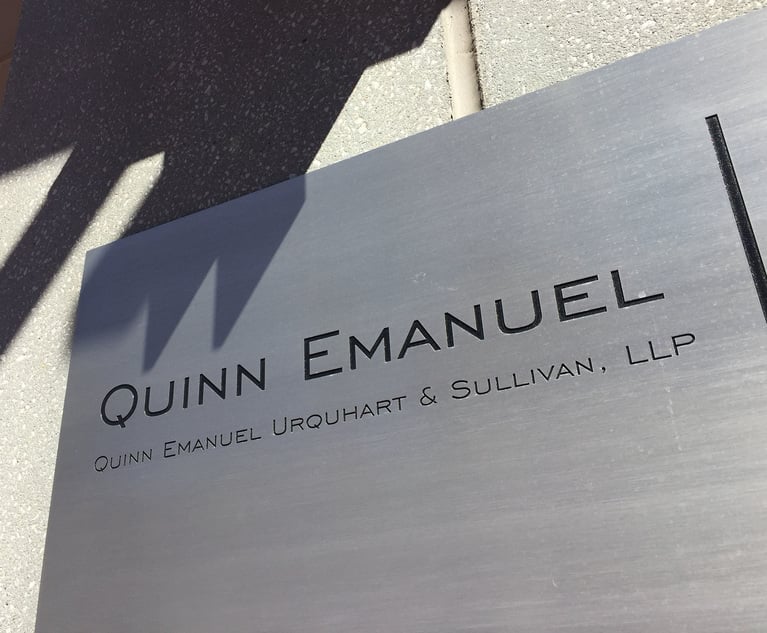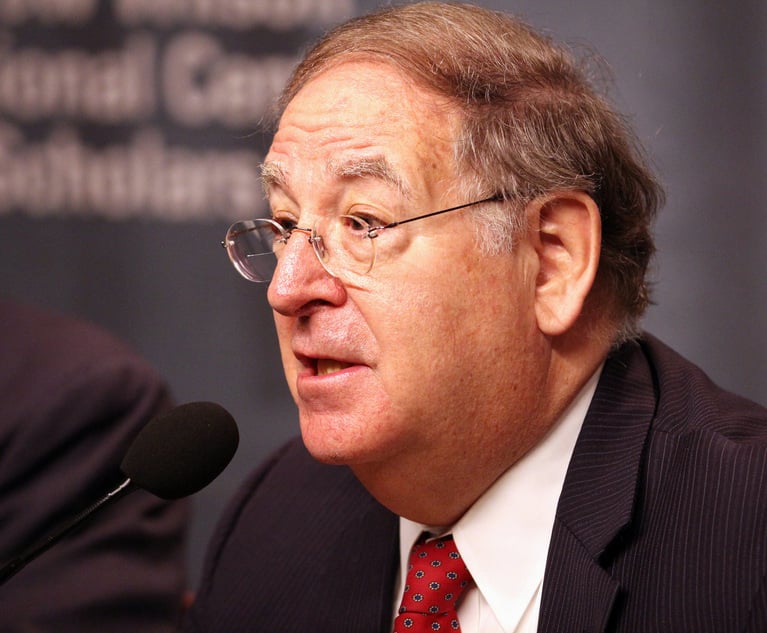How a Fee Inquiry Led to Hints of Public Corruption That Have Labaton Fighting
What began as a judge's inquiry into a $75 million attorney fee has morphed into hints of public corruption, with one of the top securities plaintiffs firms in the nation on the defensive.
June 19, 2018 at 06:52 PM
12 minute read
 Boston Harbor and Financial District. Photo: Shutterstock.com
Boston Harbor and Financial District. Photo: Shutterstock.com
What began as a judge's inquiry into a $75 million attorney fee has morphed into hints of public corruption, with one of the top securities plaintiffs firms in the nation on the defensive.
A year ago, U.S. District Judge Mark Wolf in Boston began looking into potential overbilling in a securities class action settlement with State Street Corp. To spearhead the probe, Wolf brought in a special master who filed his 377-page report on May 14 under seal.
But the report's findings prompted Wolf last month to order that George Hopkins, the executive director of the lead plaintiff, the Arkansas Teachers Retirement Fund, show up in person for a May 30 hearing. Wolf said he could end up returning a “significant amount of money” to class members, according to a transcript of that hearing. But it's not overbilling that's caught his attention. The judge appears focused on the report's finding of an undisclosed payment that went to a lawyer for a referral.
According to the hearing transcript, Wolf wanted to know more about New York-based Labaton Sucharow's relationship with the Arkansas pension fund. Then, mentioning “referral fees,” he asked about a number of individuals, including a former state legislator in Arkansas and two Texas plaintiffs lawyers. In the sealed report, one of those lawyers, referred to in the transcript as “Mr. Chargois,” said Labaton asked him to introduce the firm to institutional investors in Arkansas, the judge said. He now gets 20 percent of Labaton's fees in the class action even though he “didn't do any work for it, and there was an assiduous effort to keep that from counsel in the case and others,” the judge said in the transcript.
“I think it is foreseeable that when the report becomes public, there are going to be questions about the origin of this relationship and whether all those millions of dollars stopped with Mr. Chargois,” the judge said in a transcript.
Labaton has fought back against the allegations, insisting the payments were legal. On June 15, Wolf unsealed several documents including a June 8 motion in which the firm asked the judge to recuse himself, citing a “serious conflict” and a “legitimate concern as to whether Labaton will receive a truly impartial review.” A footnote in the motion indicated that the special master has proposed a $4.1 million cut to its fees, the “same amount as the fee paid to the referring firm.”
Also unsealed was a sidebar discussion during the May 30 hearing at which Labaton's counsel raised concerns about the judge's remarks.
“You're suggesting public corruption,” the firm's attorney, Joan Lukey, of Boston's Choate Hall & Stewart, told the judge. “Honestly, your honor, I am appalled that that was even said.”
Wolf has set a closed hearing for Friday.
Special Master's Focus
Wolf's initial concerns focused on potential overbilling on the part of the three lead plaintiffs firms, which also include San Francisco's Lieff Cabraser Heimann & Bernstein. Those firms agreed to pay the costs of the special master, Gerald Rosen, a retired federal chief judge from the Eastern District of Michigan.
In ordering Hopkins to testify, Wolf raised concerns about whether, given the findings of the report, he should replace class counsel, and the lead plaintiff, in light of a potential conflict of interest. Hopkins, in a June 6 affidavit, said he had retained outside counsel to handle questions relating to the special master's report but insisted that the Arkansas pension fund could continue to adequately represent the class.
Hopkins' counsel, Thomas Hoopes of Boston's LibbyHoopes, declined to comment.
At the hearing, Wolf asked Hopkins to explain Labaton's relationship with his pension fund.
Hopkins, in sworn testimony, told the judge: “I have never asked a law firm to hire some attorney. I have never asked a law firm to make a political contribution.”
The questioning appeared to catch Labaton off guard.
“Have you formed an opinion that there is something in this record that suggests that some form of public corruption occurred?” Lukey asked the judge during the sidebar discussion.
“No,” the judge said. “But I've formed the opinion that those are questions that are raised.” He added: “I can foresee the reasonable likelihood that the conduct of Arkansas Teacher is going to become part of the controversy, and it causes me to have questions about whether it's an appropriate lead plaintiff. Who is representing—remember what this is about. Who is representing the class?”
Labaton has its own questions. The recusal motion indicated that class counsel would be seeking an accounting of the $3.8 million they had agreed to pay to fund the special master's report.
“That millions of dollars paid by customer class counsel have been expended on the master's investigation without a suggestion of, or a shred of evidence to support, public corruption is telling,” the motion continues.
Labaton and its lawyers have frequently made campaign contributions to both federal and state politicians, but their donations to Arkansas state election campaigns have been minimal, according to a search of records since 2002 at FollowTheMoney.org, the website of the National Institute on Money in Politics.
The questions raised by the judge in this case, though, may shed light on the politics behind how plaintiffs firms often get public pension funds for clients in large securities class actions.
“This is the murky underworld of how securities fraud class action firms acquire their clients,” said Adam Pritchard of the University of Michigan Law School, who has written about how plaintiffs attorneys have made political contributions in hopes of getting institutional investor clients. “This may be an alternative way of getting yourself a lead plaintiff. People have connections—good ol' boy networks—that help grease the wheels. And, if they do that, then they expect to get paid.”
Making the Introduction
Hopkins became the executive director of the Arkansas pension fund in 2009. At the May 30 hearing, Hopkins told Wolf that even though Labaton had started working with them a year earlier, he hadn't considered moving forward on potential lawsuits.
“Then our political leaders in Arkansas convinced me that I should,” he said.
“I'm sorry, what did you say?” Wolf responded. “The political leaders convinced you that you should be interested in these class actions?”
The judge pressed Hopkins to give names. Hopkins mentioned “several legislators,” “people at the governor's staff” and “the Department of Finance Administration of Arkansas.”
But Wolf's focus was on a retired state legislator named Steve Faris. In particular, he wanted to know how much Hopkins had talked to Faris about the law firms handling the pension fund's class actions.
Faris, Hopkins explained, was a member of the Arkansas General Assembly, which has indirect supervision of the pension fund because it adopts the laws that govern the organization. He said Faris was co-chair of the public retirement committee in the state's House of Representatives at the same time Hopkins co-chaired the public retirement committee in the state Senate. They grew up in the same county and went to the same college.
Hopkins acknowledged he'd talked to Faris and others about the case.
“You know, sometimes we'd get an interesting case, and I would tell him, here's this case and Labaton represents us,” Hopkins told the judge, noting that the fund works with other firms such as Bernstein Litowitz Berger & Grossmann and Kaplan Fox & Kilsheimer. But he denied that Faris ever encouraged him to use Labaton.
“Did he ever tell you that he had a role in introducing Labaton to Arkansas Teacher?” Wolf asked.
“No, he never told me that.”
After the report came out, Faris acknowledged to Hopkins that “he had met a couple of Labaton attorneys” and introduced them to Paul Doane, who was the pension fund's executive director at the time. Hopkins told the judge “he introduced some attorneys that he knew, and sort of rolled out of the room.”
In an interview, Faris, now a board member of the Arkansas Public Employees Retirement System, acknowledged that he called Doane to introduce him to Labaton—but that was the extent of it.
“All I did was call Paul Doane and say, 'Here are these people,'” he said. “Every member of the retirement committee gets requests like that.”
Doane resigned in 2008 following a state audit that found he spent $34,515 on out-of-state travel expenses during the year he was executive director of the Arkansas pension fund.
Doane could not be reached for comment.
In court, Hopkins denied any wrongdoing occurred. He told the judge “you seem to assume that, you know, how Labaton became associated with ATRS was in some way improper, illegal, or untoward, and I don't think the record shows that.”
Labaton's attorney, Lukey, said she was shocked at the judge's remarks at the hearing, according to the transcript of the sidebar discussion. She asked the judge to clarify if he was “suggesting there was an impropriety involving Senator Faris with the monies being paid? Because there is nothing. I mean nothing.”
Wolf replied that “yes, those questions occur to me when I read it.”
Neither Labaton nor any of its current or former lawyers gave political donations to Faris, who ran in elections from 2000 to 2006, according to FollowTheMoney.org.
Finding Mr. Chargois
But Wolf didn't ask about political donations. He asked Hopkins if he knew of an Arkansas lawyer named “Herron.” Hopkins said he knew the name but had not met him. During the sidebar discussion, the judge elaborated, describing “Mr. Chargois”—the lawyer who was getting a 20 percent fee from Labaton—as having a partner named Herron who knew Faris.
The only attorneys in Arkansas by those names are Timothy Powell Herron and Damon Chargois, both with the same address in The Woodlands, Texas, according to Arkansas bar records.
Chargois did not return a call for comment.
But Herron, who said he's retired from practicing law, said in an interview that he and Chargois were law partners with an office in Arkansas. His uncle also was an aide to Faris.
“We had a referral practice,” he said. “We worked with other firms on some cases, like asbestos cases, toxic torts, things like that.”
He also insisted that that his firm worked on all the cases it referred, often handling depositions. Any referral fees would have been justified and disclosed, he said.
“We did refer a number of firms but the expectation was we wouldn't want the case if we weren't involved,” he said. “I never remember any kind of arrangement with anybody where we got a percentage and didn't do a damn thing.”
He said his memory is “fuzzy” when it comes to Labaton. He remembered the firm asked for an introduction to Faris for a case that the governor's office was handling, but he did not recall the State Street lawsuit.
“I knew some people, did some campaign contributions, so it opened a few doors,” Herron said. “George Hopkins was a longer-term friend of Steve Faris, and I imagine what happened is we may have cracked the door a bit, but Mr. Hopkins stepped in. We never had anything to do with that case. He steered that case to Labaton.”
Labaton, in a statement, called the judge's suggestion that a payment may have led to the firm's hiring is “baseless.” Further, the firm wrote, “there is no mention of any such influence payment in the special master's exhaustive report, which remains under seal” and “not a single finding suggesting that attorneys' fees awarded by the court were used to pay elected or other officials.”
“The evidence and testimony of all relevant parties in this matter is clear: the referral payment went only to the lawyer who made the original introduction of our firm to ATRS,” Labaton said in its statement. “State Senator Steve Faris has received no political contributions or any other payments from any member of either the Labaton firm or the referring lawyer, and Labaton made no payment of any kind to obtain work by ATRS.”
At the May 30 hearing, Labaton's attorney, Lukey, insisted that the referral payment at issue was legal under Massachusetts law, but a lawyer for the special master, William Sinnott, of Barrett & Singal in Boston, disputed that characterization, calling it an undisclosed “finder's fee.”
Failing to disclose the payment might be enough for the judge to be concerned, Pritchard said.
“It may be that this referral fee is nothing sordid, but that doesn't mean that it doesn't have to be disclosed to the client,” he said. “If part of the money paid by Labaton is being spent on referral fees, the court likely thinks it's entitled to know that because it has to approve the fees.”
But it's imperative that the judge ask, Labaton said in its statement.
“The special master's conclusions—which have no basis in fact or law—put the burden of disclosure of a referral payment on counsel, while the law itself places the burden on the court to ask,” the firm said. “Here the court did not ask. Thus, the court is placed in a tenuous position having to decide whether it bears responsibility for not asking—or shifting the blame to class counsel.”
This content has been archived. It is available through our partners, LexisNexis® and Bloomberg Law.
To view this content, please continue to their sites.
Not a Lexis Subscriber?
Subscribe Now
Not a Bloomberg Law Subscriber?
Subscribe Now
NOT FOR REPRINT
© 2025 ALM Global, LLC, All Rights Reserved. Request academic re-use from www.copyright.com. All other uses, submit a request to [email protected]. For more information visit Asset & Logo Licensing.
You Might Like
View All
Trump Administration Faces Legal Challenge Over EO Impacting Federal Workers
3 minute read
Private Equity Giant KKR Refiles SDNY Countersuit in DOJ Premerger Filing Row
3 minute read
Quinn Emanuel Files Countersuit Against DOJ in Row Over Premerger Reporting
3 minute read
'Thoughtful Jurist': Maryland US District Senior Judge Messitte Dies After Short Illness
4 minute readTrending Stories
- 1Am Law 200 Firms Announce Wave of D.C. Hires in White-Collar, Antitrust, Litigation Practices
- 2K&L Gates Files String of Suits Against Electronics Manufacturer's Competitors, Brightness Misrepresentations
- 3'Better of the Split': District Judge Weighs Circuit Divide in Considering Who Pays Decades-Old Medical Bill
- 4Which Georgia Courts Are Closed Today?—Here's a List
- 5After DEI Rollbacks, Employment Lawyers See Potential For Targeting Corporate Commitment to Equality
Who Got The Work
J. Brugh Lower of Gibbons has entered an appearance for industrial equipment supplier Devco Corporation in a pending trademark infringement lawsuit. The suit, accusing the defendant of selling knock-off Graco products, was filed Dec. 18 in New Jersey District Court by Rivkin Radler on behalf of Graco Inc. and Graco Minnesota. The case, assigned to U.S. District Judge Zahid N. Quraishi, is 3:24-cv-11294, Graco Inc. et al v. Devco Corporation.
Who Got The Work
Rebecca Maller-Stein and Kent A. Yalowitz of Arnold & Porter Kaye Scholer have entered their appearances for Hanaco Venture Capital and its executives, Lior Prosor and David Frankel, in a pending securities lawsuit. The action, filed on Dec. 24 in New York Southern District Court by Zell, Aron & Co. on behalf of Goldeneye Advisors, accuses the defendants of negligently and fraudulently managing the plaintiff's $1 million investment. The case, assigned to U.S. District Judge Vernon S. Broderick, is 1:24-cv-09918, Goldeneye Advisors, LLC v. Hanaco Venture Capital, Ltd. et al.
Who Got The Work
Attorneys from A&O Shearman has stepped in as defense counsel for Toronto-Dominion Bank and other defendants in a pending securities class action. The suit, filed Dec. 11 in New York Southern District Court by Bleichmar Fonti & Auld, accuses the defendants of concealing the bank's 'pervasive' deficiencies in regards to its compliance with the Bank Secrecy Act and the quality of its anti-money laundering controls. The case, assigned to U.S. District Judge Arun Subramanian, is 1:24-cv-09445, Gonzalez v. The Toronto-Dominion Bank et al.
Who Got The Work
Crown Castle International, a Pennsylvania company providing shared communications infrastructure, has turned to Luke D. Wolf of Gordon Rees Scully Mansukhani to fend off a pending breach-of-contract lawsuit. The court action, filed Nov. 25 in Michigan Eastern District Court by Hooper Hathaway PC on behalf of The Town Residences LLC, accuses Crown Castle of failing to transfer approximately $30,000 in utility payments from T-Mobile in breach of a roof-top lease and assignment agreement. The case, assigned to U.S. District Judge Susan K. Declercq, is 2:24-cv-13131, The Town Residences LLC v. T-Mobile US, Inc. et al.
Who Got The Work
Wilfred P. Coronato and Daniel M. Schwartz of McCarter & English have stepped in as defense counsel to Electrolux Home Products Inc. in a pending product liability lawsuit. The court action, filed Nov. 26 in New York Eastern District Court by Poulos Lopiccolo PC and Nagel Rice LLP on behalf of David Stern, alleges that the defendant's refrigerators’ drawers and shelving repeatedly break and fall apart within months after purchase. The case, assigned to U.S. District Judge Joan M. Azrack, is 2:24-cv-08204, Stern v. Electrolux Home Products, Inc.
Featured Firms
Law Offices of Gary Martin Hays & Associates, P.C.
(470) 294-1674
Law Offices of Mark E. Salomone
(857) 444-6468
Smith & Hassler
(713) 739-1250










